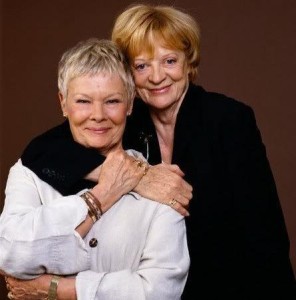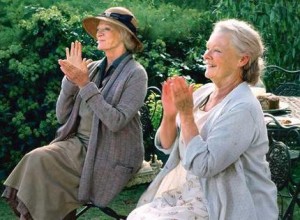 Watch their films, admire their technique and praise their efforts, but don’t ask British acting legends Dame Maggie Smith and Dame Judi Dench, to pop up on a DVD supplement and reveal how they do what they do!
Watch their films, admire their technique and praise their efforts, but don’t ask British acting legends Dame Maggie Smith and Dame Judi Dench, to pop up on a DVD supplement and reveal how they do what they do!
In this November, 2005 interview for Video Business Magazine, Disc Dish‘s Laurence Lerman learned that the hard way when he spoke to the two Dames while they were promoting their 2004 British drama Ladies in Lavender, directed by Charles Dance and released Stateside by Sony Classics.
Disc Dish: How either of you ever been involved in the creation of DVD supplemental materials?
Maggie Smith: No, not that I can remember.
Judi Dench: Well, I’m sure we have, but we’ve not been aware of it.
MS: Oh, do you mean the interviews? Yes, that’s when they ask you questions in a moment between two shots.
DD: Yes, that would be it.
MS: They ask you to do these interviews at the most alarming times. They follow you around with those fucking cameras and ask you about what you do.
DD: Wow, I thought I would be saying ‘fuck’ first–I’m the one from Brooklyn.
JD: Oh, I don’t mind answering some questions.
DD: Are you familiar with commentary tracks—when the filmmakers sit down in a studio with their film and describe how it was made as they’re watching it on the studio screen?
MS: That takes away from the magic now, doesn’t it?
DD: That’s certainly one argument – there are a number of artists who won’t record commentary tracks.
JD: They don’t want to explain, do they?
MS: I can see how that would be delightful—to learn how things were done–if it were an effects-driven film. I never forgot when I learned that someone drew in the arrows in the film of Henry V, Laurence [Olivier]’s film, after it was shot. And that was made in 1944!
JD: Isn’t that wonderful?
DD: That said, would you not feel comfortable if you were asked to sit down and talk about your acting process for a DVD supplement?
JD: British actors are reluctant and reticent about talking of the process. It’s such a private thing—it’s like having a wire frame of a person in your mind and then gradually as you go on, you build it up. But as to the question of how one does it, I don’t know if I could explain it.
MS: You might as well ask a writer how he writes or a painter how he paints. I don’t want to talk about how I create a character.
DD: Then there are others who feel differently. The Michael Caine: Acting on Film video and book series is quite popular.
MS: Well, if he thinks he can teach people about acting, he can go right ahead.
DD: But you don’t think there might be some educational benefit in talking about your process on a DVD?
JD: I think you can teach people a technique–you can teach them how to use their voices, how to breathe properly, how to move their limbs a certain way. But to actually explain how one performs comedy or drama or tragedy isn’t the same as the movements one makes.
MS: If someone is going to talk about the process of making a film, it should be the director.
DD: Okay, then what filmmaker would you like to spend an hour with via a commentary?
MS: As I said, I really don’t want to. I find films amazing when I watch them and when I see a film, I don’t want to think about the people crouching down behind furniture trying to get a certain shot. Why would you want to destroy the whole wonder of the thing? It’s like rushing to tell a child that there is no such thing as Father Christmas. Why would you tell them that?
DD: To tell you the truth, that’s something I’m still getting over.

Leave a Reply